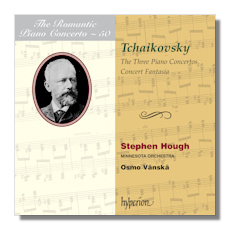
The Internet's Premier Classical Music Source
Related Links
- Tchaikovsky Reviews
- Latest Reviews
- More Reviews
-
By Composer
-
Collections
DVD & Blu-ray
Books
Concert Reviews
Articles/Interviews
Software
Audio
Search Amazon
Recommended Links
Site News
 CD Review
CD Review
Piotr Ilyitch Tchaikovsky

The Romantic Piano Concerto, Volume 50
- Concert Fantasy in G Major, Op. 56
- Concerto for Piano #1 in B Flat minor, Op. 23
- Concerto for Piano #2 in G Major, Op. 44
- Concerto for Piano #3 in E Flat Major, Op. 75
- Solitude, Op. 73 #6
- None but the Lonely Heart, Op. 6 #6
Stephen Hough, piano
Minnesota Orchestra/Osmo Vänskä
Hyperion CDA67711/2 2CDs 2:21:10
This set collects most of Tchaikovsky's works for piano and orchestra in a nifty two-disc set. Having already set down a monumental set of the Rachmaninoff concertos for the same label in Dallas with Andrew Litton, these 2009 live recordings are nothing short of thrilling. We all have our favorite First Concerto – I waver endlessly between Cliburn's poetic genius and Argerich's fiery spontaneity – but in the Second and Third, it's not like we are swimming in quality readings.
This particular First must have been a knockout live, and if anything I find it rather short on subtlety. That's not something this work has a ton of anyways, and Hough's fast and furious version will certainly please many listeners. Osmo Vänskä is a fabulous accompanist and wisely stays out of the way. The whole affair bristles with excitement, and the Minnesota Orchestra is captured in especially fine form. Not the most graceful reading, but one that makes you sit up and listen. The slow movement could arguably use a little more "slow" (gorgeous horn solo notwithstanding) but the orchestra's soloists and section leaders play so well as to silence my quibbling. Besides, coming from someone who has never counted this concerto among his favorites, I suppose I should be grateful for such flowing tempos and the continuous momentum that Vänskä and Hough gently push the music with. There's nothing gentle about the Finale, which rocks out of the gate and never lets up. In case you were wondering, Hough is on staggering form throughout. The crowd goes nuts at the end, and I really can't blame them. Following this, Hough keeps his foot on the pedal (pun intended) for a joyous romp through the composer's rarely heard Concert Fantasia. Nearly double the length of the Third Piano Concerto, it also strikes me as nearly twice as good. Hough's own arrangements of Tchaikovsky's piano pieces follow, as delightful encores to round out the disc.
Hough's recording of the Second Concerto (with alternative slow movements) leaps to the top of the short list of versions I know. Far less symphonic in nature than the First, it's also far less popular. Osmo Vänskä and his Minnesota forces are again exceptional, though they have very little to do here in the grand scheme of things. This is Hough's show, and he brings great poetry and beauty to this underrated score. Vänskä does get to open the work, and he does so with a great sense of purpose and drive. I don't know if anything can be done to mask the rather uninspired orchestral material, but launching the work so confidently can do nothing but help. Hough navigates the work with envy-inducing ease, allowing us to hear Tchaikovsky's marvelous piano writing against the delightful Minnesota winds and strings. There's so much to admire here, but the commitment and passion that shines in every bar is a joy. As a bonus, Hough gives us three versions of the slow movement. The original is very good, Alexander Siloti makes some rather unforgivable and unmusical cuts – inexplicably favored by the Detroit Symphony Orchestra in their recent Tchaikovsky Festival – and Hough's own version is predictably intelligent and insightful. Whichever you like, you can plug into the middle of the work at your will. The most notable feature of the slow movement is a lovely chamber trio between piano, violin and orchestra that should win the work fast friends. It never really has, in part because the Siloti version favored for decades made a mess of the whole movement, and in part because the work as a whole lacks the big-boned Romantic gestures that have made the First so popular. In terms of being a cohesive piece of music, I increasingly find the Second Concerto the superior work.
But both the First and Second easily trump the Third, which lasts just over 14 minutes and has never struck me as prime Tchaikovsky, or anything remotely close to that. I've never written much that was positive on the work, but as I've stated previously, there's nothing wrong in having it, and Hough gives a highly convincing performance that is sensitively conducted. Excellent sound reproduction completes a highly rewarding entry to this essential series of Romantic piano concertos.
Copyright © 2015, Brian Wigman





















